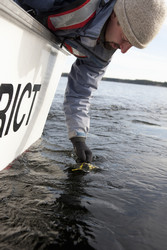A cooperative approach to mapping the marine world
From the Arctic Ocean to the middle of the Atlantic and off the shores of Crete, Europe has established a series of permanent observatories to carry out multidisciplinary measurements of the open ocean. These monitoring stations represent a formidable research resource by facilitating the monitoring of the environment to see how it is changing and helping EU scientists to better understand how the global ocean system works. Launched in September 2013, the FIXO3 (Fixed-point Open Ocean Observatory network) project aims to add further value by combining these 15 observatories into a coherent, interoperable infrastructure, and by offering marine research institutions the chance to apply for what the project calls Transnational Access (TNA) – full access with scientific and technological support. TNA is about supporting external users with coordinated access to cutting edge research infrastructure and full logistical support free of charge. The infrastructure covers 14 open-ocean observatories and one shallow water test site. Interested users can request access to one or more infrastructures and installations, and will be provided with all technical assistance necessary. The first FixO3 call for TNA, which closed on 31 July 2014, received a total of 15 proposals to nine of the infrastructures offering access. One applicant was able to successfully trial an automatic video camera at the shallow-water observatory in Spain. This allowed the Italian research institute ENEA, which owns the camera, to test its ability to analyse the structure of a specific fish community. A second TNA call for proposals opened on 1 May 2015, and is due to close on 20 July 2015. Applicants are invited to contact the observatory manager of their preferred FIXO3 location for a pre-feasibility evaluation of their project prior to submitting their proposals, which will then be evaluated by a panel of experts. User groups – particularly those from countries where no similar research infrastructure exists – are encouraged to apply. The FIX03 project also recently published a report addressing Deep Sea Mining (DSM), highlighting both the challenges and the opportunities for FIXO3 partners. While DSM represents a new and important area of exploration and investment in the marine environment, the industry faces a number of significant technological challenges relating to extraction and operation, as well environmental, legislative and socio-economic issues. FIX03 partners are well placed to provide expert analysis and advice on this critical issue. Due for completion in August 2017, the FIXO3 project is on track to achieving an integrated, regional and multidisciplinary approach to better understanding natural and manmade change in the ocean. A key legacy of the project will be the establishment of the world’s largest coordinated network of observatories, covering all parts of the ocean from the surface to the deep seafloor. Over the course of four years, FIXO3 will receive a total of EUR 7 million in EU funding. For further information please visit: FIXO3 http://www.fixo3.eu/
Countries
United Kingdom



